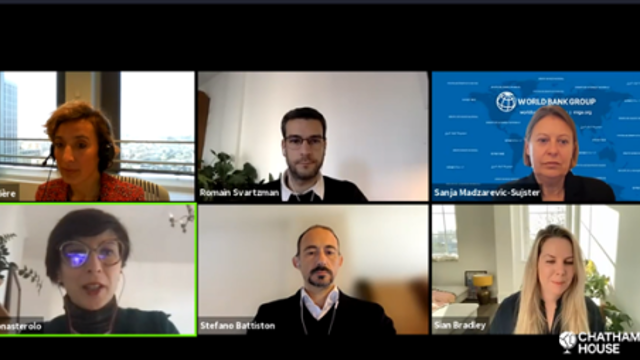A great success for the COP26 (virtual) EVENT: Macrofinancial relevance of cascading climate risks
A GREAT SUCCESS FOR THE ONLINE COP26 SIDE-EVENT ORGANISED BY EDHEC BUSINESS SCHOOL, THE VIENNA UNIVERSITY OF ECONOMICS AND BUSINESS TEAM AND CHATHAM HOUSE, WITH OVER 1800 PEOPLE REGISTERED TO LEARN FROM TOP EXPERTS ON THE IMPLICATIONS OF CASCADING CLIMATE RISKS FOR MACROECONOMIC AND FINANCIAL STABILITY.
Worsening climate change and a disorderly transition to a low-carbon economy introduce new sources of risk for countries’ sustainable development. In order to strengthen fiscal and financial risk management, it is crucial to understand through which channels climate risks can cascades onto agents and sectors of the economy and finance, and the drivers of potential shock amplification.
The direct, indirect, and cascading climate impacts that could unfold are influenced by country-specific exposures and structural characteristics and can compound with other sources of stress. However, financial industry players and policy makers still lack a coherent framework and tools to assess the macro-financial criticality of cascading climate risks to their business, and to adapt risk management.
Co-organized by Professor Irene Monasterolo from EDHEC Business School, the Vienna University of Economics and Business Team and Chatham House the COP26 side-event "Macrofinancial relevance of cascading climate risks: insights for investors and financial supervisors" aimed at uncovering the main drivers and potential implications of cascading climate risks for macroeconomic and financial stability.
In this session, the expert panel discussed the following issues:
- What are the drivers and potential implications of cascading climate risks for macroeconomic and financial stability?
- Through which channels can climate risks cascade on financial actors’ balance sheets and financial stability? Do we have the right tools to assess them?
- Could cascading risks be integrated into financial risk management of financial actors and supervisors, and what implications would this have on financial regulation?
Moderator
- Irene Monasterolo, Professor of Climate Finance, EDHEC Business School, EDHEC-Risk Institute
Speakers:
- Stefano Battiston, IPCC Lead Author; Associate Professor, Ca’ Foscari University, University of Zurich
- Marie Briere, Head of Investor Research Center, Amundi; Senior Affiliate Researcher, Université Libre de Bruxelles
- Sanja Madzarevic Sujster, Senior Economist, Macroeconomics, Trade & Investment, The World Bank
- Romain Svartzman, Economist, Banque de France
Partners: CASCADES funded by the European Union's Horizon 2020 research and innovation programme under grant agreement No. 821010, WU Wien, Waddesdon Club, Chatham House.
Learn more about the recent research by Professor Monasterolo Managing the financial risks of climate change and pandemics: What we know (and don’t know), published in On Earth.
Learn more about the recent research by Professor Monasterolo Compounding COVID-19 and climate risks: The interplay of banks’ lending and government’s policy in the shock recovery, published in the Journal of Banking & Finance.
Learn more about the recent research by Professor Monasterolo Reducing Climate Transition Risk in Central Banks’ Asset Purchasing Programs, published by CASCADES.
Irene Monasterolo is Professor of Climate Finance at EDHEC Business School and EDHEC-Risk Institute in Nice (FR) and senior research fellow at the Vienna University of Economics and Business (Austria) and Boston University (USA), as well as visiting scholar at the International Institute for Applied Systems Analysis (Austria). Irene holds a PhD in Agri-food economics and statistics from the University of Bologna (IT) and two post doctoral experiences in Cambridge (UK) and Boston University (USA), on climate finance.
Irene’s research is contributing to understand the role of finance in the achievement of the climate targets in both high income and developing countries, and the assessment of climate-financial risks and opportunities in the low-carbon transition. She has co-developed the climate stress-test of the financial system, which embeds climate scenarios in asset pricing and investors’ risk assessment, and was published in Nature Climate Change and Science. The Climate Stress test methodology included in the CLIMAFIN tool has been applied by several (public and private) financial institutions to assess investors’ exposure to climate physical and transition risks.
Irene has also co-developed the EIRIN Stock-Flow Consistent macro-financial model to analyse the implications of climate policies (fiscal, monetary, prudential) on green investments, financial stability and inequality. Currently, with the EIRIN model, Irene is supporting the World Bank in the analysis of the macro-financial criticality of compounding COVID-19 and climate risk ,and is collaborating with the European Central Bank at the analysis of the double materiality of climate risk in the EU economy and banking sector (forthcoming as European Central Bank working paper).
Irene is contributing to the G24 V20 countries’ Task Force on Climate, Development, and the IMF led by Boston University’s Global Development Policy Center, as well as to the World Bank’s Crisis Risk Analytics project of the Global Risk Financing Facility aimed to assess the macroeconomic and financial implications of compounding COVID-19 and climate physical risks.
Irene’s research has been published on leading academic journals, such as Science and Nature Climate Change, as well as on non-academic journals (e.g. Le Monde, UNPRI). She has co-edited the first special issue on Climate Risks and Financial Stability (published on Journal of Financial Stability in 2021). Irene has co-authored the G20’s T-20 chapter on Sustainable Finance, and climate finance chapters of the Financial Stability Review of the European Insurance and Occupational Pension Authority (EIOPA) and of the Austrian National Bank (OeNB).

Comments0
Please log in to see or add a comment
Suggested Articles



